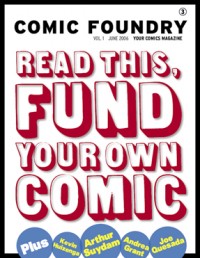 Home > CR Reviews
Home > CR Reviews Comic Foundry Volumes 1-3
posted March 28, 2006
Comic Foundry Volumes 1-3
posted March 28, 2006
 Creators:
Creators: Tim Leong (editor), Various
Publishing Information: Paper Version of the On-Line Magazine, Between 28-43 pages, No Price
Ordering Numbers:

It's fun to read these assembled issues of the
Comic Foundry on-line magazine, and also insightful. My gut feeling is that in a perfect world Tim Leong would find someone to fund a print magazine so that he could go after that mythical, meaty audience between the
Comics Journal and
Wizard camps. A problem with that strategy -- beyond the fact it's really hard to find someone wishing to fund a print project -- is that I'm not certain there
is an audience for a broad, general audience comics magazine. Comics aren't in the mainstream, not really. What drives most prose efforts in response to comics is a fervent sub-section of fandom. The people who buy only a few comics a month aren't likely to supplement such a small purchase with a print magazine. This puts a lot of pressure on
Comic Foundry to be so good it demands to be picked up on quality alone by an audience that may have their more specific tastes met elsewhere.
Comic Foundry is not yet that magazine. The good things about the magazine are the way the general approach interior design lets the magazine breathe, and some of the spins on traditional articles that, particularly in the first issue, at least give the magazine an editorial hook. The problems are more numerous and obvious. The writing varies wildly in quality. Some articles read like lengthy blog entries, right down to the self-absorbed voice used by the writer. Being in print also raises the bar a bit because of the archival role print magazines more frequently play. In an article like "25 Events That Changed Comics Forever," seeing it in print makes it feel less fun and flippant and more of a well-meaning misfire -- I wouldn't want future scholars using this as a starting point. Finally, when you aim as broad as Leong and company, you have to remember that not everyone is going to view comics with the same equanimous eye. An interview with past and present
Moon Knight creators is so different from a talk with Kevin Huizenga that their being neighbors comes across as weird rather than refereshing .
Most of all, the magazine needs that last measure of attention to editorial direction.
Comic Foundry runs the danger of seeming more like a magazine from someone who really wanted a magazine rather than a publication from someone who wanted to say something. The natural impulses underscoring each issue seem to be a broad magazine for generalists
and a magazine for networking professionals. This should be made a lot more clear, even if it's to do something as abrupt as to section off the publication.


